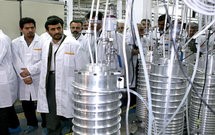 The announcement about the talks (at Kazakhstan in February 2013) between Iran and the six powers (US, UK, France, Germany, China and Russia), after an eight months break, is being seen as an optimistic breakthrough. What has changed since the last talks in Moscow? Has the Iranian leadership become softer on this issue? Or has the international community become more accommodating?
The announcement about the talks (at Kazakhstan in February 2013) between Iran and the six powers (US, UK, France, Germany, China and Russia), after an eight months break, is being seen as an optimistic breakthrough. What has changed since the last talks in Moscow? Has the Iranian leadership become softer on this issue? Or has the international community become more accommodating?
Moscow Dialogue, June 2012: What has changed since then?
The dialogue held in Moscow in June 2012 displayed differences in the basic perspectives of the negotiating parties. According to Catherine Ashton, the European Union’s top foreign policy representative and the lead negotiator in this case, there were, “Significant gaps between the substance of the two positions” (The Washington Post, 20 June 2012). While the US and its allies wanted to limit the conversation to nuclear issues, Iran wanted to address a wider range of security concerns. There were attempts from P5+1 to also urge Iran to admit to the existence of nuclear weapons in the past in the country. The policy followed by the West towards the alleged Iranian nuclear programme was to ‘stop, shut and ship.’
There is a certain “optimism” that is being linked to the Kazakhstan talks visible in the various positive public statements being made. The optimism could very well be the result of the softening of the Iranian approach towards the US, a consequence of the strict sanctions, or just an extension of the “new policy” that the United States seems to be following towards Iran. Iranian Foreign Minister Ali Akbar Salehi said in Berlin on Monday that he was "optimistic" regarding what he saw as a new approach from the United States regarding Iran. The new approach is aimed at the resolution of the issue of the Iranian nuclear programme by bilateral talks between Iran and the US.
Optimism or Layered Pessimism?
US Vice President, Joe Biden’s claim about the presence of necessary seriousness as a pre-requisite for negotiations to take place, portrays the uncertainty that exists between the negotiating parties. Iran still claims that its nuclear programme has no intentions of developing weapons whereas it still enriches uranium in violation of the UNSC resolutions.
The pessimism visible within the Iranian state nullifies the claim towards the softening of the Iranian approach towards the West. Salehi might be optimistic about the talks but Haj-Sadeghi, the representative of the Supreme Leader Ayatollah Ali Khamenei had a different opinion. Sadeghi claimed, “They will never want real dialogue and negotiations” referring to the United States. If the majority views the West with suspicion and the Supreme Leader still views the US as an “aggressive and interventionist arrogant power” then the fate of the negotiations does not look bright. It is believed that the issue within Iran is not the negotiations but the method of pressurising Iran into it over the years. If that is the case, there seems to be no substantial change in the scenario even now.
The image of Iran as a pariah state given its nuclear ambitions has not changed since the last round of talks at Moscow. The hype about the optimism contradicts the uncertainty that exists about the intentions of Iran with regard to the talks. Biden claimed that he was ready to engage in bilateral talks with Iran if there was some seriousness and not merely "for the exercise." British Foreign Secretary William Hague also stressed on the need for Iranian seriousness in the process of engagement by claiming that, "the onus is on Iran to respond seriously and turn its declared willingness to negotiate into concrete action." These statements show that Iran still needs to work on its image and the much hyped optimism about the next round of talks may simply be just rhetoric.
Joseph Nye in “New approaches to nuclear proliferation policy” claimed that it is difficult to evolve a policy that would slow down the spread of nuclear weapons since that would result in causing friction between countries. The friction is evident in this scenario too. Nuclear weapons (the currency of power) if attained by Iran, will restructure the strategic environment. Why then will Iran let go of such an opportunity?
There is definitely a sense of optimism being portrayed by the media but it is unlikely that the negotiations will be affected by it. Obama and the western powers too seem to see the “optimism” in the future of the talks. The only choice left is to wait for this round of talks and see if the decade long tiff gets resolved in any way or ends up being the usual “mere engagement.”
Courtesy : Institute of Peace and Conflict Studies (http://www.ipcs.org)